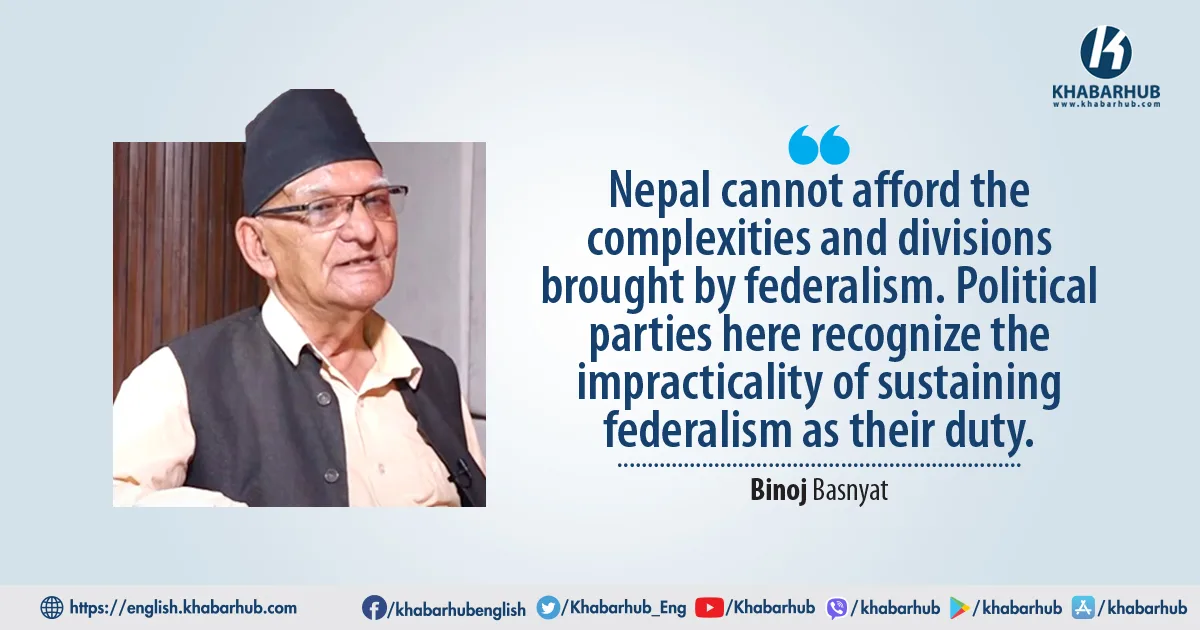KATHMANDU: Chitra Bahadur KC, Chairman of Rastriya Janamorcha has consistently voiced opposition to federalism.
His stance dates back to the political shifts of 2062/63 BS, during the rise of federalism demands, where he staunchly opposed the anti-federalism faction, presenting his arguments in local dialects in Baglung, his birthplace.
Despite federal and local levels being enshrined in Nepal’s 2015 Constitution, KC remains steadfastly against federalism.
During the constitutional drafting, Constituent Assembly members asserted they sacrificed state resources and toured Europe to bring federalism akin to Switzerland to Nepal.
KC counters that his long-standing contention against Nepali states renders federalism unnecessary in the eyes of the populace today.
In a conversation with Khabarhub, he questions the rationale behind federalism if duplicating central court proceedings at the provincial level is inevitable. Excerpts:
You advocate abolishing federalism, yet find little traction. Given its inability to thrive or endure, what do you foresee now?
The sustainability of any system hinges on numerous factors: economic conditions, geographical realities, and the leadership’s tendencies.
The Rastriya Janamorcha Nepal rightly contends that federalism isn’t suitable for our nation.
Your party has been consistent on this issue since the Constituent Assembly. Can you elaborate on your stance?
Absolutely. Supporters of Janamorcha from across Nepal have been against the idea of federalism saying it is not necessary as it poses a risk to national integrity.
While Nepal remains sovereign, external influences wield significant sway.
Responsible leaders and rulers must shoulder their responsibilities.
You’re often described as anti-federalism. Is that a fair characterization for Nepal’s context?
Certainly. Nepal cannot afford the complexities and divisions brought by federalism. Political parties here recognize the impracticality of sustaining federalism as their duty.
The Interim Constitution of 2062/63 initially outlined options between a unitary or federal system. How did this evolve?
The original intent was clear: the Constituent Assembly would determine Nepal’s governance structure.
However, this right was later removed, favoring a federal system with separate provinces including Madhesh.
What about the current sentiment towards federalism?
Political parties have gradually acknowledged that federalism isn’t feasible. This realization has strengthened, especially as we observe the challenges and disunity it brings.
How do you propose addressing Nepal’s governance challenges without federalism?
Democratic decentralization is essential. Empowering local governments without unnecessary bureaucratic layers can effectively manage our diverse nation.
Are there concerns about regional representation under a unitary system?
Regional representation is vital, but it can be managed through effective governance structures that do not necessitate the fragmentation caused by federalism.
What role do you see for Nepal’s political future?
Unity under a unitary system is paramount. It’s crucial to resist external pressures that seek to divide us ethnically or regionally under the guise of federalism.
But hasn’t Upendra Yadav been a hindrance to your demands?
The landlords in Terai initially unified but have since fragmented in pursuit of power.
Some aim to eventually separate regions from Nepal, from Kakadbhitta to Mahendranagar.
Recently, this unity has faltered. They refrain from endorsing federalism openly, attributing current issues to the failures of federal rulers.
During the past nine years, Kathmandu alone has hosted 70 parliamentarians from states and unions.
What have they achieved? Democratic decentralization should empower rural municipalities without the need for provinces.
Nepali people must unite to advocate for its abolition. Janamorcha has strived to empower Madhesis like Chaudhary but faces obstacles.
Federalism, under the guise of creating ethnic provinces, has stirred caste conflicts.
Nepal should adopt a unitary system to unify its leadership and steer clear of federalism’s divisive tendencies.
Are the people who advocated for federalism now sidelined?
Truth prevails in the end, and change is coming to the Nepalese people now.
However, some leaders have gradually made people think that the Terai is not part of Nepal. Now, the people of the Terai have realized that federalism has become impractical.
Is federalism a systemic error because it cannot be effectively managed administratively?
We need to consider implementing a system that suits our country. When the Constitution was introduced, members of the Constituent Assembly flew to Europe, leaving behind the state treasury.
They advocated for Nepal to adopt a federal system and emulate Switzerland, using public funds.
At that time, I argued against the need for provinces in Nepal. Now, it is clear that even the Nepali people do not support federalism.
If provinces are not justified, why should the same principles apply to promote regionalism within provinces?
Yesterday, during discussions about justification, there seemed to be confusion among those accusing others of being ‘anti-federalist’ and resistant to change. Are those leaders gradually following your path?
It appears that those who oppose federalism in Nepal are gaining strength. By entangling themselves in the federal system, they are burning the bread of that federalism.
The Maoists, who advocated for caste-based provinces, gained power and deceived the people.
Their strategy has been to use federalism to create ethnic conflict by separating areas from Kakadvitta in the Terai to Mahendranagar in the hills and mountains.
However, Nepali people have become more aware, and even supporters of federalism have recognized its limitations.
Sooner or later, people will discard a system that is unsuitable for their country.
Just as the people of India endured British imperialism for 200 years before ultimately rebelling, even powerful systems eventually fall.
When people realize that a system is flawed, they will seek a more suitable alternative.
By the time people understand and initiate decisive action, much damage may already be done.
Those of us who survive must exercise restraint and educate the public. When will federalism end, or will it achieve a safe landing?
So far, the people have driven the change in Nepal. Therefore, the people of the country will decide on any system that is introduced.
The people are now actively rejecting the federal system in favor of the unitary system.
They are holding the Singha Durbar and political parties accountable for their actions in the name of the state.
What are your thoughts on the new political forces?
I have no comments on them. Unlike the established major parties, they lack a significant history.
While the major parties have their flaws, they have a democratic history.
However, the emergence of new players like Jogi Jun, who make grand promises, and the current Home Minister’s media antics have quickly revealed their shortcomings. Their actions have not lived up to their rhetoric.









Comment